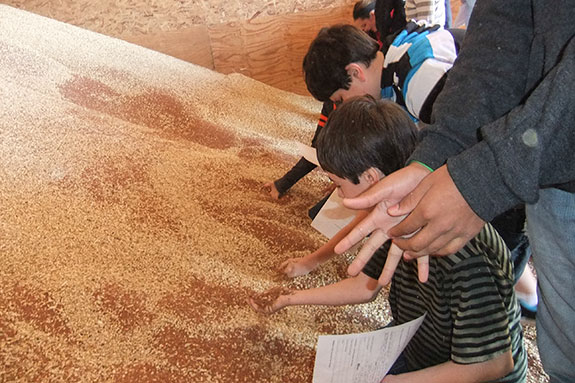Oregonians love their farmers, but after conducting multiple surveys of the Oregon urban populace, evidence showed they questioned some of the agricultural practices. The Agri-Business Council of Oregon (ABC) decided something needed to be done about that.
“Oregon has a phenomenal Ag in the Classroom program, but its focus is really at the elementary school level. "The State of Oregon has funding for agricultural education, but it’s all tied to grades 9-12, primarily through the support of FFA programs,” states Geoff Horning, Executive Director of ABC.
“Our research indicated that in Oregon we were not providing our middle-school students much in terms of agricultural education, and many studies show that the middle-school student is at an age where they start questioning everything and they’re searching for answers.
"Just as importantly, the information they learn oftentimes sets a perception that they carry for the rest of their lives. The Agri-Business Council of Oregon Board of Directors determined that we needed to be a part of that conversation.”
ABC directors then collaborated with farmers and middle-school science teachers to create the Adopt A Farmer program.
How it works
The ABC partners a producer with a middle-school science teacher for an entire academic year. It’s important to note this is not just one class, but all the science classes of that teacher between sixth to eighth grades.
In some cases, it may be as few as 30 students, and in other cases it could be as many as 200, with the average around 100 students per producer.
In the fall, the ABC pays to bus all of these students to their adopted farmer. By having the field trip in the fall, it creates an emotional attachment between the students and the producer that creates a better learning environment when the producer comes into the classroom.
Then when the farmer visits the classroom, he’s not just another adult, he’s their farmer. Following the field trip the producer is asked to visit the classroom three times, usually in November, January and April. In some cases, a second field trip is planned in the spring.
Who’s participating
In addition to egg farmers, wheat producers, vegetable producers, hazelnut farms, nurseries, cherry farms, vegetable seed and tulip farms, this year the program will add a cattle rancher and a dairy producer for the first time.
The lineup also includes several grass-seed growers, and most of them grow the full gamut of the varieties grown in Oregon (fescue, rye, etc.).
 Students from Mark Twain Middle School in Silverton visit the grass-seed cleaner as part of a field trip to Victor Point Farms near Silverton, Oregon.
Students from Mark Twain Middle School in Silverton visit the grass-seed cleaner as part of a field trip to Victor Point Farms near Silverton, Oregon. Curriculum
Program developers made the conscious decision not to create specific curriculum for teachers to present.
Rather, the program is designed so the corresponding adopted farmer or rancher makes presentations that supplement what the teacher is already teaching the students.
A handful of activities or modules were created that the producer can use in the classroom, but the strength of the program lies in the relationship building that takes place.
Horning states, “At the end of the day, as an industry we need to do a better job of putting the faces of agriculture in front of the urban populace. Heck, just look at the success of the God Made a Farmer ad.
"If we questioned whether we were going down the right path with this program – which we weren’t – that commercial galvanized our belief that building these relationships is the key benefit of the Adopt a Farmer program.”










